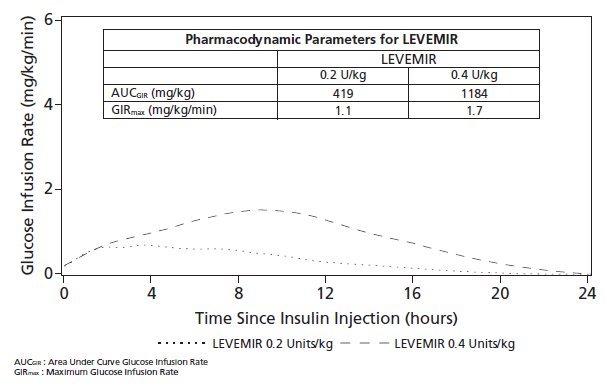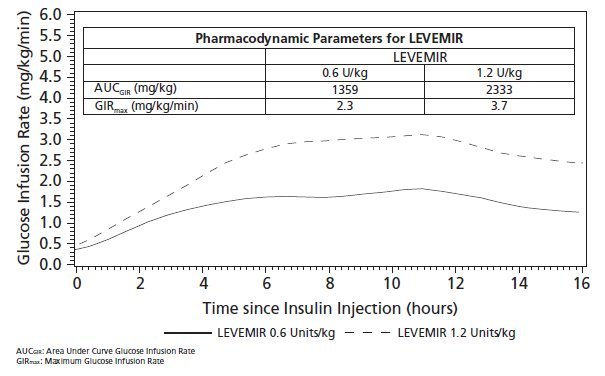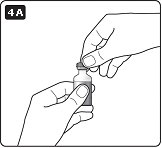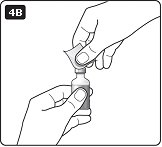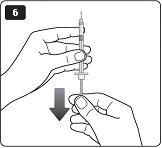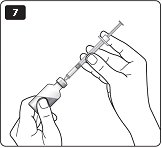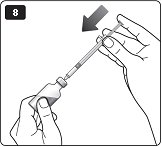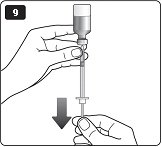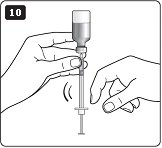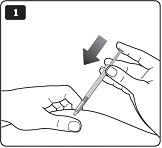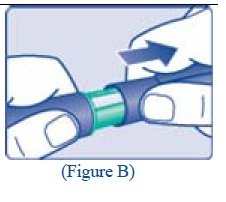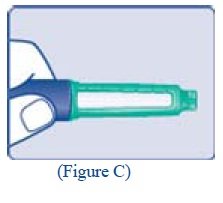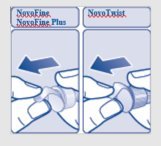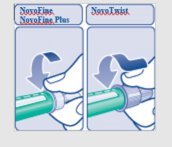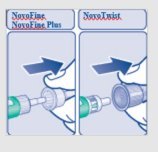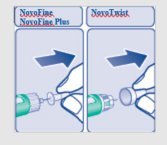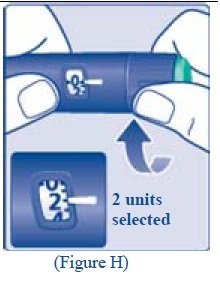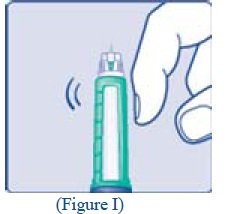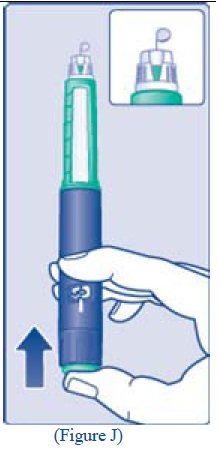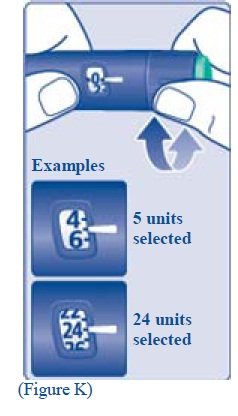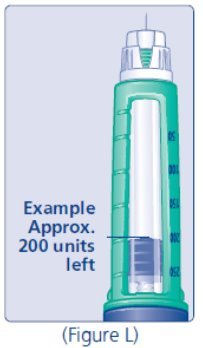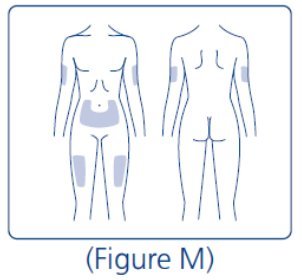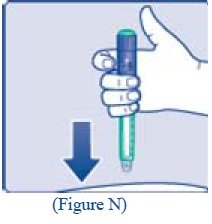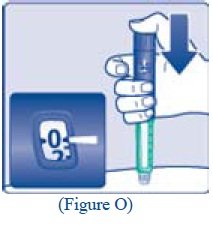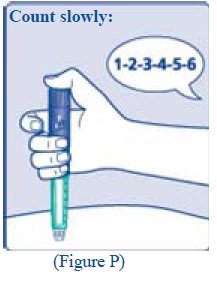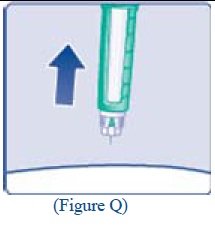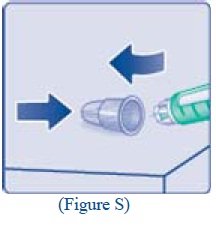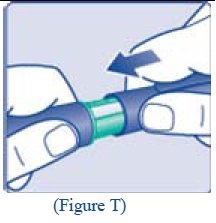Levemir: Package Insert / Prescribing Info
Package insert / product label
Generic name: insulin detemir
Dosage form: injection, solution
Drug class: Insulin
J Code (medical billing code): J1815 (Per 5 units, injection)
Medically reviewed by Drugs.com. Last updated on Dec 16, 2024.
On This Page
- Indications and Usage
- Dosage and Administration
- Dosage Forms and Strengths
- Contraindications
- Warnings and Precautions
- Adverse Reactions/Side Effects
- Drug Interactions
- Use In Specific Populations
- Overdosage
- Description
- Clinical Pharmacology
- Nonclinical Toxicology
- Clinical Studies
- How Supplied/Storage and Handling
- Patient Counseling Information
Highlights of Prescribing Information
See full prescribing information for LEVEMIR.
LEVEMIR® (insulin detemir) injection, for subcutaneous use
Initial U.S. Approval: 2005
Indications and Usage for Levemir
LEVEMIR is a long-acting human insulin analog indicated to improve glycemic control in adult and pediatric patients with diabetes mellitus (1).
Limitations of Use:
Not recommended for the treatment of diabetic ketoacidosis.
Levemir Dosage and Administration
- •
- See Full Prescribing Information for important administration instructions (2.1).
- •
- Inject subcutaneously into the thigh, upper arm, or abdomen (2.1).
- •
- Rotate injection sites to reduce risk of lipodystrophy and localized cutaneous amyloidosis (2.1).
- •
- Individualize and titrate the dose of LEVEMIR based on the patient’s metabolic needs, blood glucose monitoring results, and glycemic control goal (2.2).
- •
- Administer subcutaneously once daily or in divided doses twice daily (2.2).
- •
- See Full Prescribing Information for recommended starting dose in insulin naïve patients and patients already on insulin therapy (2.3, 2.4).
Dosage Forms and Strengths
Contraindications
Warnings and Precautions
- •
- Never Share a LEVEMIR FlexPen, insulin syringe, or needle between patients, even if the needle is changed (5.1).
- •
- Hyperglycemia or hypoglycemia with changes in insulin regimen: Make changes to a patient’s insulin regimen (e.g., insulin strength, manufacturer, type, injection site or method of administration) under close medical supervision with increased frequency of blood glucose monitoring (5.2).
- •
- Hypoglycemia: May be life-threatening. Increase frequency of glucose monitoring with changes to: insulin dosage, concomitant drugs, meal pattern, physical activity; and in patients with renal impairment or hepatic impairment or hypoglycemia unawareness (5.3).
- •
- Hypoglycemia due to medication errors: Accidental mix-ups between insulin products can occur. Instruct patients to check insulin labels before injection (5.4).
- •
- Hypersensitivity reactions: Severe, life-threatening, generalized allergy, including anaphylaxis, can occur. Discontinue LEVEMIR, monitor and treat if indicated (5.5).
- •
- Hypokalemia: May be life-threatening. Monitor potassium levels in patients at risk for hypokalemia and treat if indicated (5.6).
- •
- Fluid retention and heart failure with concomitant use of thiazolidinediones (TZDs): Observe for signs and symptoms of heart failure; consider dosage reduction or discontinuation if heart failure occurs (5.7).
Adverse Reactions/Side Effects
Adverse reactions associated with LEVEMIR include hypoglycemia, allergic reactions, injection site reactions, lipodystrophy, rash and pruritus (6).
To report SUSPECTED ADVERSE REACTIONS, contact Novo Nordisk Inc. at 1-800-727-6500 or FDA at 1-800-FDA-1088 or www.fda.gov/medwatch
Drug Interactions
See 17 for PATIENT COUNSELING INFORMATION and FDA-approved patient labeling.
Revised: 12/2022
Full Prescribing Information
1. Indications and Usage for Levemir
LEVEMIR is indicated to improve glycemic control in adult and pediatric patients with diabetes mellitus.
Limitations of Use
LEVEMIR is not recommended for the treatment of diabetic ketoacidosis.
2. Levemir Dosage and Administration
2.1 Important Administration Instructions
- •
- Always check insulin labels before administration [see Warnings and Precautions (5.4)].
- •
- Visually inspect for particulate matter and discoloration. Only use LEVEMIR if the solution appears clear and colorless.
- •
- Inject LEVEMIR subcutaneously into the thigh, upper arm, or abdomen.
- •
- Rotate injection sites within the same region from one injection to the next to reduce the risk of lipodystrophy and localized cutaneous amyloidosis. Do not inject into areas of lipodystrophy or localized cutaneous amyloidosis [see Warnings and Precautions (5.2), Adverse Reactions (6)].
- •
- During changes to a patient’s insulin regimen, increase the frequency of blood glucose monitoring [see Warnings and Precautions (5.2)].
- •
- Do not dilute or mix LEVEMIR with any other insulin or solution.
- •
- Do not administer LEVEMIR intravenously or in an insulin infusion pump.
- •
- LEVEMIR FlexPen dials in 1-unit increments.
- •
- Use the LEVEMIR FlexPen with caution in patients with visual impairment who may rely on audible clicks to dial their dose.
2.2 General Dosing Instructions
- •
- LEVEMIR can be administered by subcutaneous injection once or twice daily. Administer once daily doses with the evening meal or at bedtime. For twice daily dosing, administer the evening dose with the evening meal, at bedtime, or 12 hours after the morning dose.
- •
- Individualize and titrate the dose of LEVEMIR based on the patient’s metabolic needs, blood glucose monitoring results, and glycemic control goal.
- •
- Dose adjustments may be needed with changes in physical activity, changes in meal patterns (i.e., macronutrient content or timing of food intake), changes in renal or hepatic function or during acute illness to minimize the risk of hypoglycemia or hyperglycemia [see Warnings and Precautions (5.3)].
- •
- In patients with type 1 diabetes, LEVEMIR must be used in a regimen with rapid-acting or short-acting insulin.
2.3 Starting Dose in Insulin Naïve Patients
Recommended Starting Dosage in Patients with Type 1 Diabetes
The recommended starting dose of LEVEMIR in patients with type 1 diabetes mellitus is approximately one-third to one-half of the total daily insulin dose. The remainder of the total daily insulin dose should be administered as short-acting pre-meal insulin. As a general rule, 0.2 to 0.4 units of insulin per kilogram of body weight can be used to calculate the initial total daily insulin dose in insulin naïve patients with type 1 diabetes.
Recommended Starting Dosage in Patients with Type 2 Diabetes
The recommended starting dose of LEVEMIR in patients with type 2 diabetes mellitus inadequately controlled on oral antidiabetic medications or a GLP-1 receptor agonist is 10 units (or 0.1 units/kg to 0.2 units/kg) given once daily in the evening or divided into a twice daily regimen.
2.4 Switching to LEVEMIR from Other Insulin Therapies
Dosage adjustments are recommended to lower the risk of hypoglycemia when switching patients to LEVEMIR from another insulin therapy [see Warnings and Precautions (5.3)].
- •
- If converting from insulin glargine to LEVEMIR, the change can be done on a unit-to-unit basis.
- •
- If converting from NPH insulin, the change can be done on a unit-to-unit basis. However, some patients with type 2 diabetes mellitus may require more LEVEMIR than NPH insulin, as observed in one trial [see Clinical Studies (14)].
3. Dosage Forms and Strengths
Injection: 100 units/mL (U-100), is a clear, colorless, solution available as:
- •
- 3 mL single-patient-use FlexPen prefilled pen
- •
- 10 mL multiple-dose vial
4. Contraindications
LEVEMIR is contraindicated:
- •
- During episodes of hypoglycemia [see Warnings and Precautions (5.3)]
- •
- In patients with hypersensitivity to insulin detemir or any of the excipients in LEVEMIR. Reactions have included anaphylaxis [see Warnings and Precautions (5.5) and Adverse Reactions (6.1)].
5. Warnings and Precautions
5.1 Never Share a LEVEMIR FlexPen, Needle, or Insulin Syringe between Patients
LEVEMIR FlexPen prefilled pens must never be shared between patients, even if the needle is changed. Patients using LEVEMIR vials should never share needles or syringes with another person. Sharing poses a risk for transmission of blood-borne pathogens.
5.2 Hyperglycemia or Hypoglycemia with Changes in Insulin Regimen
Changes in an insulin regimen (e.g., insulin strength, manufacturer, type, injection site or method of administration) may affect glycemic control and predispose to hypoglycemia [see Warnings and Precautions (5.4)] or hyperglycemia. Repeated insulin injections into areas of lipodystrophy or localized cutaneous amyloidosis have been reported to result in hyperglycemia; and a sudden change in the injection site (to an unaffected area) has been reported to result in hypoglycemia [see Adverse Reactions (6)].
Make any changes to a patient’s insulin regimen under close medical supervision with increased frequency of blood glucose monitoring. Advise patients who have repeatedly injected into areas of lipodystrophy or localized cutaneous amyloidosis to change the injection site to unaffected areas and closely monitor for hypoglycemia. For patients with type 2 diabetes, dosage adjustments of concomitant antidiabetic products may be needed [see Dosage and Administration (2.4)].
5.3 Hypoglycemia
Hypoglycemia is the most common adverse reaction of insulin, including LEVEMIR [see Adverse Reactions (6.1)]. Severe hypoglycemia can cause seizures, may be life-threatening or cause death. Hypoglycemia can impair concentration ability and reaction time; this may place the patient and others at risk in situations where these abilities are important (e.g., driving or operating other machinery). LEVEMIR, or any insulin, should not be used during episodes of hypoglycemia [see Contraindications (4)].
Hypoglycemia can happen suddenly and symptoms may differ in each patient and change over time in the same patient. Symptomatic awareness of hypoglycemia may be less pronounced in patients with longstanding diabetes, in patients with diabetic neuropathy, using drugs that block the sympathetic nervous system (e.g., beta-blockers) [see Drug Interactions (7)], or who experience recurrent hypoglycemia.
Risk Factors for Hypoglycemia
The risk of hypoglycemia generally increases with intensity of glycemic control. The risk of hypoglycemia after an injection is related to the duration of action of the insulin [see Clinical Pharmacology (12.2)] and, in general, is highest when the glucose lowering effect of the insulin is maximal. As with all insulins, the glucose lowering effect time course of LEVEMIR may vary among different patients or at different times in the same patient and depends on many conditions, including the area of injection as well as the injection site blood supply and temperature.
Other factors which may increase the risk of hypoglycemia include changes in meal pattern (e.g., macronutrient content or timing of meals), changes in level of physical activity, or changes to concomitant drugs [see Drug Interactions (7)]. When a GLP-1 receptor agonist is used in combination with LEVEMIR, the LEVEMIR dose may need to be lowered or more conservatively titrated to minimize the risk of hypoglycemia [see Adverse Reactions (6.1)]. Patients with renal or hepatic impairment may be at higher risk of hypoglycemia [see Use in Specific Populations (8.6, 8.7)].
Risk Mitigation Strategies for Hypoglycemia
Patients and caregivers must be educated to recognize and manage hypoglycemia. Self-monitoring of blood glucose plays an essential role in the prevention and management of hypoglycemia. In patients at higher risk for hypoglycemia and patients who have reduced symptomatic awareness of hypoglycemia, increased frequency of blood glucose monitoring is recommended.
5.4 Hypoglycemia Due to Medication Errors
Accidental mix-ups between insulin products have been reported. To avoid medication errors between LEVEMIR and other insulins, instruct patients to always check the insulin label before each injection.
5.5 Hypersensitivity Reactions
Severe, life-threatening, generalized allergy, including anaphylaxis, can occur with insulins, including LEVEMIR [see Adverse Reactions (6.1)]. If hypersensitivity reactions occur, discontinue LEVEMIR; treat per standard of care and monitor until symptoms and signs resolve. LEVEMIR is contraindicated in patients who have had hypersensitivity reactions to insulin detemir or any of the excipients.
5.6 Hypokalemia
All insulins, including LEVEMIR, cause a shift in potassium from the extracellular to intracellular space, possibly leading to hypokalemia. Untreated hypokalemia may cause respiratory paralysis, ventricular arrhythmia, and death. Monitor potassium levels in patients at risk for hypokalemia if indicated (e.g., patients using potassium-lowering medications, patients taking medications sensitive to serum potassium concentrations).
5.7 Fluid Retention and Heart Failure with Concomitant Use of PPAR-gamma Agonists
Thiazolidinediones (TZDs), which are peroxisome proliferator-activated receptor (PPAR)-gamma agonists, can cause dose-related fluid retention, when used in combination with insulin. Fluid retention may lead to or exacerbate heart failure. Patients treated with insulin, including LEVEMIR, and a PPAR-gamma agonist should be observed for signs and symptoms of heart failure. If heart failure develops, it should be managed according to current standards of care, and discontinuation or dose reduction of the PPAR-gamma agonist must be considered.
6. Adverse Reactions/Side Effects
The following adverse reactions are discussed elsewhere:
- •
- Hypoglycemia [see Warnings and Precautions (5.3)]
- •
- Hypoglycemia Due to Medication errors [see Warnings and Precautions (5.4)]
- •
- Hypersensitivity Reactions [see Warnings and Precautions (5.5)]
- •
- Hypokalemia [see Warnings and Precautions (5.6)]
6.1 Clinical Trial Experience
Because clinical trials are conducted under widely varying designs, the adverse reaction rates reported in one clinical trial may not be easily compared to those rates reported in another clinical trial, and may not reflect the rates actually observed in clinical practice.
The frequencies of adverse reactions (excluding hypoglycemia) reported during LEVEMIR clinical trials in patients with type 1 diabetes mellitus and type 2 diabetes mellitus are listed in Tables 1-4 below. See Tables 5 and 6 for the hypoglycemia findings.
In two pooled trials, adults with type 1 diabetes were exposed to individualized doses of LEVEMIR (n=767) or NPH (n=388). The mean duration of exposure to LEVEMIR was 153 days, and the total exposure to LEVEMIR was 321 patient-years. The most common adverse reactions are summarized in Table 1.
|
LEVEMIR, % (n = 767) |
|
|
Upper respiratory tract infection |
26.1 |
|
Headache |
22.6 |
|
Pharyngitis |
9.5 |
|
Influenza-like illness |
7.8 |
|
Abdominal Pain |
6.0 |
Adults with type 1 diabetes were exposed to LEVEMIR (n=161) or insulin glargine (n=159). The mean duration of exposure to LEVEMIR was 176 days, and the total exposure to LEVEMIR was 78 patient-years. The most common adverse reactions are summarized in Table 2.
|
LEVEMIR, % (n = 161) |
|
|
Upper respiratory tract infection |
26.7 |
|
Headache |
14.3 |
|
Back pain |
8.1 |
|
Influenza-like illness |
6.2 |
|
Gastroenteritis |
5.6 |
|
Bronchitis |
5.0 |
In two pooled trials, adults with type 2 diabetes were exposed to LEVEMIR (n=432) or NPH (n=437). The mean duration of exposure to LEVEMIR was 157 days, and the total exposure to LEVEMIR was 186 patient-years. The most common adverse reactions were comparable to that observed in adult patients with type 1 diabetes mellitus; see Table 1.
Pediatric patients with type 1 diabetes were exposed to individualized doses of LEVEMIR (n=232) or NPH (n=115). The mean duration of exposure to LEVEMIR was 180 days, and the total exposure to LEVEMIR was 114 patient-years. The most common adverse reactions are summarized in Table 3.
|
LEVEMIR, % (n = 232) |
|
|
Upper respiratory tract infection |
35.8 |
|
Headache |
31.0 |
|
Pharyngitis |
17.2 |
|
Gastroenteritis |
16.8 |
|
Influenza-like illness |
13.8 |
|
Abdominal pain |
13.4 |
|
Pyrexia |
10.3 |
|
Cough |
8.2 |
|
Viral infection |
7.3 |
|
Nausea |
6.5 |
|
Rhinitis |
6.5 |
|
Vomiting |
6.5 |
Hypoglycemia
Hypoglycemia was the most commonly observed adverse reaction in patients treated with LEVEMIR. The rates of reported hypoglycemia depend on the definition of hypoglycemia used, diabetes type, insulin dose, intensity of glucose control, background therapies, and other intrinsic and extrinsic patient factors. For these reasons, comparing rates of hypoglycemia in clinical trials for LEVEMIR with the incidence of hypoglycemia for other products may be misleading and also, may not be representative of hypoglycemia rates that will occur in clinical practice.
Table 4 (type 1 diabetes) and Table 5 (type 2 diabetes) summarize the incidence of severe and non-severe hypoglycemia in the LEVEMIR clinical trials.
For the adult trials and one of the pediatric trials (Study D), severe hypoglycemia was defined as an event with symptoms consistent with hypoglycemia requiring assistance of another person and associated with either a plasma glucose value below 56 mg/dL (blood glucose below 50 mg/dL) or prompt recovery after oral carbohydrate, intravenous glucose or glucagon administration. For the other pediatric trial (Study I), severe hypoglycemia was defined as an event with semi-consciousness, unconsciousness, coma and/or convulsions in a patient who could not assist in the treatment and who may have required glucagon or intravenous glucose.
For the adult trials and pediatric trial (Study D), non-severe hypoglycemia was defined as an asymptomatic or symptomatic plasma glucose <56 mg/dL (or equivalently blood glucose <50 mg/dL as used in Study A and C) that was self-treated by the patient. For pediatric Study I, non-severe hypoglycemia included asymptomatic events with plasma glucose <65 mg/dL as well as symptomatic events that the patient could self-treat or treat by taking oral therapy provided by the caregiver.
|
Severe Hypoglycemia |
Non-Severe Hypoglycemia |
||||
|
Percent of patients with at least 1 event (n/total N) |
Event/patient/ year |
Percent of patients (n/total N) |
Event/patient/ year |
||
|
Study A Type 1 Diabetes Adults 16 weeks In combination with insulin aspart |
Twice-Daily LEVEMIR |
8.7 (24/276) |
0.52 |
88.0 (243/276) |
26.4 |
|
Study B Type 1 Diabetes Adults 26 weeks In combination with insulin aspart |
Twice-Daily LEVEMIR |
5.0 (8/161) |
0.13 |
82.0 (132/161) |
20.2 |
|
Study C Type 1 Diabetes Adults 24 weeks In combination with regular insulin |
Once-Daily LEVEMIR |
7.5 (37/491) |
0.35 |
88.4 (434/491) |
31.1 |
|
Study D Type 1 Diabetes Pediatrics 26 weeks In combination with insulin aspart |
Once- or Twice Daily LEVEMIR |
15.9 (37/232) |
0.91 |
93.1 (216/232) |
31.6 |
|
Study I Type 1 Diabetes Pediatrics 52 weeks In combination with insulin aspart |
Once- or Twice Daily LEVEMIR |
1.7 (3/177) |
0.02 |
94.9 (168/177) |
56.1 |
|
Study E Type 2 Diabetes Adults 24 weeks In combination with oral agents |
Study F Type 2 Diabetes Adults 22 weeks In combination with insulin aspart |
Study H Type 2 Diabetes Adults 26 weeks in combination with Liraglutide and Metformin |
||
|
Twice-Daily LEVEMIR |
Once- or Twice Daily LEVEMIR |
Once Daily LEVEMIR + Liraglutide + Metformin |
||
|
Severe hypoglycemia |
Percent of patients with at least 1 event (n/total N) |
0.4 (1/237) |
1.5 (3/195) |
0 |
|
Event/patient/year |
0.01 |
0.04 |
0 |
|
|
Non-severe hypoglycemia |
Percent of patients (n/total N) |
40.5 (96/237) |
32.3 (63/195) |
9.2 (15/163) |
|
Event/patient/year |
3.5 |
1.6 |
0.29 |
|
- Hypersensitivity Reactions
- Severe, life-threatening, generalized allergy, including anaphylaxis, generalized skin reactions, angioedema, bronchospasm, hypotension, and shock have occurred with insulin, including LEVEMIR, and may be life-threatening.
Insulin Initiation and Intensification of Glucose Control
Intensification or rapid improvement in glucose control has been associated with a transitory, reversible ophthalmologic refraction disorder, worsening of diabetic retinopathy, and acute painful peripheral neuropathy. However, long-term glycemic control decreases the risk of diabetic retinopathy and neuropathy.
Lipodystrophy
Long-term use of insulin, including LEVEMIR, can cause lipodystrophy at the site of repeated insulin injections. Lipodystrophy includes lipohypertrophy (thickening of adipose tissue) and lipoatrophy (thinning of adipose tissue), and may affect insulin absorption [see Dosage and Administration (2.1)].
Weight Gain
Weight gain can occur with insulin therapy, including LEVEMIR, and has been attributed to the anabolic effects of insulin and the decrease in glucosuria [see Clinical Studies (14)]. In the clinical program, the mean change in body weight from baseline in adult patients with type 1 diabetes (Study A, B, and C) treated with LEVEMIR ranged from -0.3 kg to 0.5 kg. The mean change in body weight from baseline in adult patients with type 2 diabetes (Study E, F, and H) treated with LEVEMIR ranged from 0.5 kg to 1.2 kg.
Peripheral Edema
Insulin, including LEVEMIR, may cause sodium retention and edema, particularly if previously poor metabolic control is improved by intensified insulin therapy.
Injection Site Reactions
Patients taking LEVEMIR may experience injection site reactions, including localized erythema, pain, pruritus, urticaria, edema, and inflammation. In clinical studies in adults, three patients treated with LEVEMIR reported injection site pain (0.25%).
Immunogenicity
All insulin products can elicit the formation of insulin antibodies. These insulin antibodies may increase or decrease the efficacy of insulin and may require adjustment of the insulin dose. In clinical trials of LEVEMIR, antibody development has been observed with no apparent impact on glycemic control.
6.2 Postmarketing Experience
The following adverse reactions have been identified during post approval use of LEVEMIR. Because these reactions are reported voluntarily from a population of uncertain size, it is not always possible to reliably estimate their frequency or establish a causal relationship to drug exposure.
Medication errors have been reported in which rapid-acting or short-acting insulins and other insulins, have been accidentally administered instead of LEVEMIR.
Localized cutaneous amyloidosis at the injection site has occurred. Hyperglycemia has been reported with repeated insulin injections into areas of localized cutaneous amyloidosis; hypoglycemia has been reported with a sudden change to an unaffected injection site.
7. Drug Interactions
Table 6 includes clinically significant drug interactions with LEVEMIR.
Table 6: Clinically Significant Drug Interactions with LEVEMIR
|
Drugs That May Increase the Risk of Hypoglycemia |
||
|
Drugs: |
Antidiabetic agents, ACE inhibitors, angiotensin II receptor blocking agents, disopyramide, fibrates, fluoxetine, monoamine oxidase inhibitors, pentoxifylline, pramlintide, salicylates, somatostatin analogs (e.g., octreotide), and sulfonamide antibiotics, GLP-1 receptor agonists, DPP-4 inhibitors, SGLT-2 inhibitors. |
|
|
Intervention: |
Dosage reductions and increased frequency of glucose monitoring may be required when LEVEMIR is co-administered with these drugs. |
|
|
Drugs That May Decrease the Blood Glucose Lowering Effect of LEVEMIR |
||
|
Drugs: |
Atypical antipsychotics (e.g., olanzapine and clozapine), corticosteroids, danazol, diuretics, estrogens, glucagon, isoniazid, niacin, oral contraceptives, phenothiazines, progestogens (e.g., in oral contraceptives), protease inhibitors, somatropin, sympathomimetic agents (e.g., albuterol, epinephrine, terbutaline), and thyroid hormones. |
|
|
Intervention: |
Dosage increases and increased frequency of glucose monitoring may be required when LEVEMIR is co-administered with these drugs. |
|
|
Drugs That May Increase or Decrease the Blood Glucose Lowering Effect of LEVEMIR |
||
|
Drugs: |
Alcohol, beta-blockers, clonidine, and lithium salts. Pentamidine may cause hypoglycemia, which may sometimes be followed by hyperglycemia. |
|
|
Intervention: |
Dosage adjustment and increased frequency of glucose monitoring may be required when LEVEMIR is co-administered with these drugs. |
|
|
Drugs That May Blunt Signs and Symptoms of Hypoglycemia |
||
|
Drugs: |
Beta-blockers, clonidine, guanethidine, and reserpine |
|
|
Intervention: |
Increased frequency of glucose monitoring may be required when LEVEMIR is co-administered with these drugs. |
|
8. Use In Specific Populations
8.1 Pregnancy
Risk Summary
Available data from published studies and postmarketing case reports with LEVEMIR use in pregnant women have not identified a drug-associated risk of major birth defects, miscarriage, or adverse maternal or fetal outcomes. In a randomized, parallel-group, open-label clinical trial that included 152 pregnant women with type 1 diabetes who were administered LEVEMIR once or twice daily, beginning in gestational weeks 8 to 12 or prior to conception, no clear evidence of maternal or fetal risk associated with LEVEMIR was observed (see Data). There are risks to the mother and fetus associated with poorly controlled diabetes in pregnancy (see Clinical Considerations).
Animal reproduction studies were conducted in non-diabetic pregnant rats and rabbits with insulin detemir administration at 3 and 135 times the human dose of 0.5 units/kg/day, respectively, throughout pregnancy. Overall, the effects of insulin detemir did not generally differ from those observed with regular human insulin (see Data).
In the U.S. general population, the estimated background risk of major birth defects and miscarriage in clinically recognized pregnancies is 2 to 4% and 15 to 20%, respectively. The estimated background risk of major birth defects is 6 to 10% in women with pre-gestational diabetes with a peri-conceptional HbA1c >7 and has been reported to be as high as 20 to 25% in women with a peri-conceptional HbA1c >10. The estimated background risk of miscarriage for the indicated population is unknown.
Clinical Considerations
Disease-Associated Maternal and/or Embryo/Fetal Risk
Hypoglycemia and hyperglycemia occur more frequently during pregnancy in patients with pre-gestational diabetes. Poorly controlled diabetes in pregnancy increases the maternal risk for diabetic ketoacidosis, preeclampsia, spontaneous abortions, preterm delivery, and delivery complications. Poorly controlled diabetes increases the fetal risk for major birth defects, stillbirth, and macrosomia-related morbidity.
Data
Human Data
In an open-label clinical trial, pregnant females with type 1 diabetes (n=310) were treated with LEVEMIR (once or twice daily) or NPH insulin (once, twice, or thrice daily); both groups also received preprandial insulin aspart. Approximately half of the study participants in each arm were randomized as pregnant and were exposed to NPH or to other insulins prior to conception and in the first 8 weeks of gestation. The rates of preeclampsia observed in the study were within expected rates for pregnancy complicated by diabetes. No differences in pregnancy outcomes or the health of the fetus and newborn were seen between the two groups. In this study, the proportion of subjects with severe hypoglycemia and non-severe hypoglycemia was similar between the two treatment arms; for the definitions of severe hypoglycemia and non-severe hypoglycemia [see Adverse Reactions (6.1)].
In about a quarter of infants, LEVEMIR was detected in the infant cord blood at levels above the lower level of quantification (<25 pmol/L).
Animal Data
In a fertility and embryonic development study, insulin detemir was administered to female rats before mating, during mating, and throughout pregnancy at doses up to 300 nmol/kg/day (3 times a human dose of 0.5 units/kg/day, based on plasma area under the curve (AUC) ratio). Doses of 150 and 300 nmol/kg/day produced numbers of litters with visceral anomalies. Doses up to 900 nmol/kg/day (approximately 135 times a human dose of 0.5 units/kg/day based on AUC ratio) were given to rabbits during organogenesis. Drug and dose related increases in the incidence of fetuses with gallbladder abnormalities such as small, bilobed, bifurcated, and missing gallbladders were observed at a dose of 900 nmol/kg/day. The rat and rabbit embryo-fetal development studies that included concurrent human insulin control groups indicated that insulin detemir and human insulin had similar effects regarding embryotoxicity and teratogenicity suggesting that the effects seen were the result of hypoglycemia resulting from insulin exposure in normal animals.
8.2 Lactation
Risk Summary
Available data from published literature demonstrate that exogenous human insulin products, including biosynthetic insulins such as insulin detemir, are transferred into human milk. There are no published reports of adverse reactions, including hypoglycemia, in breastfed infants exposed to exogenous human insulin products, including insulin detemir, in breastmilk. There are no data on the effects of exogenous human insulin products, including insulin detemir, on milk production. The developmental and health benefits of breastfeeding should be considered along with the mother’s clinical need for LEVEMIR and any potential adverse effects on the breastfed infant from LEVEMIR or from the underlying maternal condition.
8.4 Pediatric Use
The safety and effectiveness of LEVEMIR to improve glycemic control in pediatric patients with diabetes mellitus have been established. The use of LEVEMIR for this indication is supported by evidence from adequate and well-controlled trials (Studies D and I) in 694 pediatric patients aged 2 to 17 years with type 1 diabetes mellitus [see Clinical Studies (14.2)] and from other studies in pediatric patients and adults with diabetes mellitus [see Clinical Pharmacology (12.3), Clinical Studies (14.3)].
8.5 Geriatric Use
In clinical trials of LEVEMIR, 64 of 1624 patients (4%) in the type 1 diabetes trials and 309 of 1082 patients (29%) in the type 2 diabetes trials were 65 years or older. A total of 52 (7 type 1 and 45 type 2) patients (2%) were 75 years or older. No overall differences in safety or effectiveness were observed between these patients and younger patients, but small sample sizes limits conclusions. Greater sensitivity of some older individuals cannot be ruled out. In geriatric patients, the initial dosing, dosage increments, and maintenance dosage should be conservative to avoid hypoglycemia. Hypoglycemia may be difficult to recognize in the geriatric patients.
8.6 Renal Impairment
No difference was observed in the pharmacokinetics of LEVEMIR between non-diabetic patients with kidney impairment and healthy volunteers. However, some studies with human insulin have shown increased circulating insulin concentrations in patients with kidney impairment. Careful glucose monitoring and dose adjustments of LEVEMIR, may be necessary in patients with kidney impairment [see Clinical Pharmacology (12.3)].
8.7 Hepatic Impairment
Non-diabetic patients with severe hepatic impairment had lower systemic exposures to insulin detemir compared to healthy volunteers. However, some studies with human insulin have shown increased circulating insulin concentrations in patients with liver impairment. Careful glucose monitoring and dosage adjustments of LEVEMIR, may be necessary in patients with hepatic impairment [see Clinical Pharmacology (12.3)].
10. Overdosage
An excess of insulin relative to food intake, energy expenditure, or both may lead to severe and sometimes prolonged and life-threatening hypoglycemia and hypokalemia [see Warnings and Precautions (5.3, 5.6)]. Mild episodes of hypoglycemia usually can be treated with oral glucose. Lowering the insulin dosage, and adjustments in meal patterns, or exercise may be needed. More severe episodes with coma, seizure, or neurologic impairment may be treated with a glucagon product for emergency use or concentrated intravenous glucose. After apparent clinical recovery from hypoglycemia, continued observation and additional carbohydrate intake may be necessary to avoid recurrence of hypoglycemia. Hypokalemia must be corrected appropriately.
11. Levemir Description
Insulin detemir is a long-acting recombinant human insulin analog produced by a process that includes expression of recombinant DNA in Saccharomyces cerevisiae followed by chemical modification.
Insulin detemir differs from human insulin in that the amino acid threonine in position B30 has been omitted, and a C14 fatty acid chain has been attached to the amino acid B29. Insulin detemir has a molecular formula of C267H402O76N64S6 and a molecular weight of 5.917 kDa. It has the following structure:
Figure 1: Structural Formula of Insulin Detemir
LEVEMIR (insulin detemir) injection is a clear, colorless, aqueous, neutral sterile solution for subcutaneous use. Each milliliter of LEVEMIR contains 100 units insulin detemir, dibasic sodium phosphate (0.71 mg), glycerin (16 mg), metacresol (2.06 mg), phenol (1.8 mg), sodium chloride (1.17 mg), zinc (65.4 mcg), and Water for Injection, USP. Hydrochloric acid and/or sodium hydroxide may be added to adjust pH. LEVEMIR has a pH of approximately 7.4.
12. Levemir - Clinical Pharmacology
12.1 Mechanism of Action
The primary activity of insulin, including LEVEMIR, is regulation of glucose metabolism. Insulins and its analogs lower blood glucose by stimulating peripheral glucose uptake, especially by skeletal muscle and fat, and by inhibiting hepatic glucose production. Insulin also inhibits lipolysis and proteolysis, and enhances protein synthesis.
12.2 Pharmacodynamics
Insulin detemir is a soluble, long-acting basal human insulin analog with up to a 24-hour duration of action. The pharmacodynamic profile of LEVEMIR is relatively constant with no pronounced peak.
The duration of action of LEVEMIR is mediated by slowed systemic absorption of insulin detemir molecules from the injection site due to self-association of the drug molecules. In addition, the distribution of insulin detemir to peripheral target tissues is slowed because of binding to albumin.
Figure 2 shows results from a study in patients with type 1 diabetes conducted for a maximum of 24 hours after the subcutaneous injection of LEVEMIR. The mean time between injection and the end of pharmacological effect for insulin detemir ranged from 7.6 hours to >24 hours (24 hours was the end of the observation period).
Figure 2: Glucose Lowering Effect in Patients with Type 1 Diabetes in a 24-hour Glucose Clamp Study
For doses in the interval of 0.2 to 0.4 units/kg, insulin detemir exerts more than 50% of its maximum effect from 3 to 4 hours up to approximately 14 hours after dose administration.
Figure 3 shows glucose infusion rate results from a 16-hour glucose clamp study in patients with type 2 diabetes. The clamp study was terminated at 16 hours according to protocol.
Figure 3: Glucose Lowering Effect in Patients with Type 2 Diabetes in a 16-hour Glucose Clamp Study
12.3 Pharmacokinetics
Absorption
After subcutaneous injection of LEVEMIR in healthy subjects and in patients with diabetes, insulin detemir serum concentrations had a relatively constant concentration/time profile over 24 hours with the maximum serum concentration (Cmax) reached between 6-8 hours post-dose. Insulin detemir was more slowly absorbed after subcutaneous administration to the thigh where AUC0-5h was 30-40% lower and AUC0-inf was 10% lower than the corresponding AUCs with subcutaneous injections to the deltoid and abdominal regions.
The absolute bioavailability of insulin detemir is approximately 60%.
Distribution
Insulin detemir has an apparent volume of distribution of approximately 0.1 L/kg. More than 98% of insulin detemir in the bloodstream is bound to albumin. The results of in vitro and in vivo protein binding studies demonstrate that there is no clinically relevant interaction between insulin detemir and fatty acids or other protein-bound drugs.
Elimination
After subcutaneous administration in patients with type 1 diabetes, insulin detemir has a terminal half-life of 5 to 7 hours depending on dose.
Specific Populations
Pediatric Patients
The pharmacokinetic properties of LEVEMIR were studied in pediatric patients 6-12 years, 13-17 years, and adults with type 1 diabetes. In pediatric patients 6-12 years, the insulin detemir plasma area under the curve (AUC) and Cmax were increased by 10% and 24%, respectively, as compared to adults. There was no difference in pharmacokinetics between pediatric patients 13-17 years and adults.
Geriatrics
In a clinical trial studying differences in pharmacokinetics of a single subcutaneous dose of LEVEMIR in young (20 to 35 years) versus elderly (≥68 years) healthy subjects, the insulin detemir AUC was up to 35% higher among the elderly subjects due to reduced clearance [see Use in Specific Populations (8.5)].
Gender
No clinically relevant differences in pharmacokinetic parameters of LEVEMIR are observed between males and females.
Race
In two clinical pharmacology studies conducted in healthy Japanese and Caucasian subjects, there were no clinically relevant differences seen in pharmacokinetic parameters. The pharmacokinetics and pharmacodynamics of LEVEMIR were studied in a clamp study comparing patients with type 2 diabetes of Caucasian, African-American, and Latino origin. Dose-response relationships for LEVEMIR were comparable in these three populations.
Renal impairment
A single subcutaneous dose of 0.2 units/kg of LEVEMIR was administered to healthy subjects and those with varying degrees of renal impairment (mild, moderate, severe, and hemodialysis-dependent). In this study, there were no differences in the pharmacokinetics of LEVEMIR between healthy subjects and those with renal impairment [see Use in Specific Populations (8.6)].
Hepatic impairment
A single subcutaneous dose of 0.2 units/kg of LEVEMIR was administered to healthy subjects and those with varying degrees of hepatic impairment (mild, moderate and severe). LEVEMIR exposure as estimated by AUC decreased with increasing degrees of hepatic impairment with a corresponding increase in apparent clearance [see Use in Specific Populations (8.7)].
Smoking
The effect of smoking on the pharmacokinetics and pharmacodynamics of LEVEMIR has not been studied.
Liraglutide
No pharmacokinetic interaction was observed between liraglutide and LEVEMIR when separate subcutaneous injections of LEVEMIR 0.5 units/kg (single-dose) and liraglutide 1.8 mg (steady state) were administered in patients with type 2 diabetes.
13. Nonclinical Toxicology
13.1 Carcinogenesis, Mutagenesis, Impairment of Fertility
Standard 2-year carcinogenicity studies in animals have not been performed. Insulin detemir tested negative for genotoxic potential in the in vitro reverse mutation study in bacteria, human peripheral blood lymphocyte chromosome aberration test, and the in vivo mouse micronucleus test.
In a fertility and embryonic development study, insulin detemir was administered to female rats before mating, during mating, and throughout pregnancy at doses up to 300 nmol/kg/day (3 times a human dose of 0.5 units/kg/day, based on plasma AUC ratio). There were no effects on fertility in the rat.
14. Clinical Studies
The efficacy and safety of LEVEMIR given once-daily at bedtime or twice-daily (before breakfast and at bedtime, before breakfast and with the evening meal, or at 12-hour intervals) was compared to that of once-daily or twice-daily NPH insulin in open-label, randomized, parallel trials of 1155 adults with type 1 diabetes mellitus, 347 pediatric patients with type 1 diabetes mellitus, and 869 adults with type 2 diabetes mellitus. The efficacy and safety of LEVEMIR given twice-daily was compared to once-daily insulin glargine in an open-label, randomized, parallel trial of 320 patients with type 1 diabetes. The evening LEVEMIR dose was titrated in all trials according to pre-defined targets for fasting blood glucose. The pre-dinner blood glucose was used to titrate the morning LEVEMIR dose in those trials that also administered LEVEMIR in the morning. In general, the reduction in HbA1c with LEVEMIR was similar to that with NPH insulin or insulin glargine.
14.1 Clinical Studies in Adult Patients with Type 1 Diabetes
In a 16-week open-label clinical trial (Study A, n=409), adults with type 1 diabetes were randomized to treatment with either LEVEMIR at 12-hour intervals, LEVEMIR administered in the morning and bedtime or NPH insulin administered in the morning and bedtime. Insulin aspart was also administered before each meal. At 16 weeks of treatment, the combined LEVEMIR-treated patients had similar HbA1c and fasting plasma glucose (FPG) reductions compared to the NPH-treated patients (Table 7). Differences in timing of LEVEMIR administration had no effect on HbA1c, fasting plasma glucose (FPG), or body weight.
In a 26-week, open-label clinical trial (Study B, n=320), adults with type 1 diabetes were randomized to twice-daily LEVEMIR (administered in the morning and bedtime) or once-daily insulin glargine (administered at bedtime). Insulin aspart was administered before each meal. LEVEMIR-treated patients had a decrease in HbA1c similar to that of insulin glargine-treated patients.
In a 24-week, open-label clinical trial (Study C, n=749), adults with type 1 diabetes were randomized to once-daily LEVEMIR or once-daily NPH insulin, both administered at bedtime and in combination with regular human insulin before each meal. LEVEMIR and NPH insulin had a similar effect on HbA1c.
|
Study A |
Study B |
Study C |
||||
|
Treatment duration |
16 weeks |
26 weeks |
24 weeks |
|||
|
Treatment in combination with |
NovoLog (insulin aspart) |
NovoLog (insulin aspart) |
Human Soluble Insulin (regular insulin) |
|||
|
Twice-daily LEVEMIR |
Twice-daily NPH |
Twice-daily LEVEMIR |
Once-daily insulin glargine |
Once-daily LEVEMIR |
Once-daily NPH |
|
|
Number of patients treated |
276 |
133 |
161 |
159 |
492 |
257 |
|
HbA1c (%) | ||||||
|
Baseline HbA1c |
8.6 |
8.5 |
8.9 |
8.8 |
8.4 |
8.3 |
|
Adj. mean change from baseline |
-0.8* |
-0.7* |
-0.6** |
-0.5** |
-0.1* |
0.0* |
|
LEVEMIR – NPH 95% CI for Treatment difference |
-0.2 (-0.3, -0.0) |
-0.0 (-0.2, 0.2) |
-0.1 (-0.3, 0.0) |
|||
|
Fasting blood glucose (mg/dL) | ||||||
|
Baseline mean |
209 |
220 |
153 |
150 |
213 |
206 |
|
Adj. mean change from baseline |
-44* |
-9* |
-38** |
-41** |
-30* |
-9* |
*From an ANCOVA model adjusted for baseline value and country.
**From an ANCOVA model adjusted for baseline value and study site.
14.2 Clinical Studies in Pediatric Patients with Type 1 Diabetes
Two open-label, randomized, controlled clinical trials have been conducted in pediatric patients with type 1 diabetes. One trial (Study D) was 26 weeks in duration and enrolled patients 6 to 17 years of age. The other trial (Study I) was 52 weeks in duration and enrolled patients 2 to 16 years of age. In both trials, LEVEMIR and NPH insulin were administered once- or twice-daily. Bolus insulin aspart was administered before each meal. In the 26-week trial, LEVEMIR-treated patients had a mean decrease in HbA1c similar to that of NPH insulin (Table 8). In the 52-week trial, the randomization was stratified by age (2-5 years, n=82, and 6-16 years, n=265) and the mean HbA1c increased in both treatment arms, with similar findings in the 2-5 year-old age group (n=80) and the 6-16 year-old age group (n=258) (Table 8).
|
Study D |
Study I |
|||
|
Treatment duration |
26 weeks |
52 weeks |
||
|
Treatment in combination with |
NovoLog (insulin aspart) |
NovoLog (insulin aspart) |
||
|
Once- or Twice Daily LEVEMIR |
Once- or Twice Daily NPH |
Once- or Twice Daily LEVEMIR |
Once- or Twice Daily NPH |
|
|
Number of subjects treated |
232 |
115 |
177 |
170 |
|
HbA1c (%) | ||||
|
Baseline HbA1c |
8.8 |
8.8 |
8.4 |
8.4 |
|
Adj. mean change from baseline |
-0.7* |
-0.8* |
0.3** |
0.2** |
|
LEVEMIR – NPH 95% CI for Treatment difference |
0.1 -0.1; 0.3 |
0.1 -0.1; 0.4 |
||
|
Fasting blood glucose (mg/dL) | ||||
|
Baseline mean |
181 |
181 |
135 |
141 |
|
Adj. mean change from baseline |
-39 |
-21 |
-10** |
0** |
*From an ANCOVA model adjusted for baseline value, geographical region, gender and age (covariate).
**From an ANCOVA model adjusted for baseline value, country, pubertal status at baseline and age (stratification factor).
14.3 Clinical Studies in Adult Patients with Type 2 Diabetes
In a 24-week, open-label, randomized, clinical trial (Study E, n=476), LEVEMIR administered twice-daily (before breakfast and evening) was compared to NPH insulin administered twice-daily (before breakfast and evening) as part of a regimen of stable combination therapy with one or two of the following oral antidiabetic medications: metformin, an insulin secretagogue, or an alpha–glucosidase inhibitor. All patients were insulin-naïve at the time of randomization. LEVEMIR and NPH insulin similarly lowered HbA1c from baseline (Table 9).
In a 22-week, open-label, randomized, clinical trial (Study F, n=395) in adults with type 2 diabetes, LEVEMIR and NPH insulin were given once- or twice-daily as part of a basal-bolus regimen with insulin aspart. As measured by HbA1c or FPG, LEVEMIR had efficacy similar to that of NPH insulin.
Table 9: Type 2 Diabetes Mellitus – Adult
|
Study E |
Study F |
|||
|
Treatment duration |
24 weeks |
22 weeks |
||
|
Treatment in combination with |
oral agents |
insulin aspart |
||
|
Twice-daily LEVEMIR |
Twice-daily NPH |
Once- or Twice Daily LEVEMIR |
Once- or Twice Daily NPH |
|
|
Number of subjects treated |
237 |
239 |
195 |
200 |
|
HbA1c (%) | ||||
|
Baseline HbA1c |
8.6 |
8.5 |
8.2 |
8.1 |
|
Adj. mean change from baseline |
-2.0* |
-2.1* |
-0.6** |
-0.6** |
|
LEVEMIR – NPH 95% CI for Treatment difference |
0.1 (-0.0, 0.3) |
-0.1 (-0.2, 0.1) |
||
|
Fasting blood glucose1 (mg/dL) | ||||
|
Baseline mean |
179 |
173 |
- |
- |
|
Adj. mean change from baseline |
-69* |
-74* |
- |
- |
1Study F - Fasting blood glucose data not collected
*From an ANCOVA model adjusted for baseline value, country and oral antidiabetic treatment category.
**From an ANCOVA model adjusted for baseline value and country.
Combination Therapy with Metformin and Liraglutide
This 26-week open-label trial enrolled 988 patients with inadequate glycemic control (HbA1c 7-10%) on metformin (≥1500 mg/day) alone or inadequate glycemic control (HbA1c 7-8.5%) on metformin (≥1500 mg/day) and a sulfonylurea. Patients who were on metformin and a sulfonylurea discontinued the sulfonylurea then all patients entered a 12-week run-in period during which they received add-on therapy with liraglutide titrated to 1.8 mg once-daily. At the end of the run-in period, 498 patients (50%) achieved HbA1c <7% with liraglutide 1.8 mg and metformin and continued treatment in a non-randomized, observational arm. Another 167 patients (17%) withdrew from the trial during the run-in period with approximately one-half of these patients doing so because of gastrointestinal adverse reactions. The remaining 323 patients with HbA1c ≥7% (33% of those who entered the run-in period) were randomized to 26 weeks of once-daily LEVEMIR administered in the evening as add-on therapy (n=162) or to continued, unchanged treatment with liraglutide 1.8 mg and metformin (n=161). The starting dose of LEVEMIR was 10 units/day and the mean dose at the end of the 26-week randomized period was 39 units/day. During the 26-week randomized treatment period, the percentage of patients who discontinued due to ineffective therapy was 11.2% in the group randomized to continued treatment with liraglutide 1.8 mg and metformin and 1.2% in the group randomized to add-on therapy with LEVEMIR.
Treatment with LEVEMIR as add-on to liraglutide 1.8 mg + metformin resulted in statistically significant reductions in HbA1c and FPG compared to continued, unchanged treatment with liraglutide 1.8 mg + metformin alone (Table 10). From a mean baseline body weight of 96 kg after randomization, there was a mean reduction of 0.3 kg in the patients who received LEVEMIR add-on therapy compared to a mean reduction of 1.1 kg in the patients who continued on unchanged treatment with liraglutide 1.8 mg + metformin alone.
Table 10: Results of a 26-week Open-label Trial of LEVEMIR as Add-on to Liraglutide + Metformin Compared to Continued Treatment with Liraglutide + Metformin Alone in Patients Not Achieving HbA1c <7% After 12 Weeks of Metformin and Liraglutide
|
Study H |
||
|
LEVEMIR + Liraglutide +Metformin |
Liraglutide+ Metformin |
|
|
Intent-to-Treat Population (N)a |
162 |
157 |
|
HbA1c (%) (Mean) | ||
|
Baseline (week 0) |
7.6 |
7.6 |
|
Adjusted mean change from baseline |
-0.5* |
0* |
|
Difference from liraglutide + metformin arm (LS mean)b 95% Confidence Interval |
-0.5*** (-0.7, -0.4) | |
|
Percentage of patients achieving A1c <7% |
43** |
17** |
|
Fasting Plasma Glucose (mg/dL) (Mean) | ||
|
Baseline (week 0) |
166 |
159 |
|
Adjusted mean change from baseline |
-38* |
-7* |
|
Difference from liraglutide + metformin arm (LS mean)b 95% Confidence Interval |
-31*** (-39, -23) | |
aIntent-to-treat population using last observation on study
bLeast squares mean adjusted for baseline value
*From an ANCOVA model adjusted for baseline value, country and previous oral antidiabetic treatment category.
**From a logistic regression model adjusted for baseline HbA1c.
***p-value <0.0001
16. How is Levemir supplied
16.1 How Supplied
LEVEMIR (insulin detemir) injection 100 units/mL (U-100) is a clear and colorless solution available in the following presentations:
|
Presentation |
NDC |
|
3 mL Single-patient-use FlexPen pen |
0169-6432-10 |
|
10 mL Multiple-dose vial |
0169-3687-12 |
Additional Information about LEVEMIR FlexPen:
- •
- The pen dials in 1-unit increments.
- •
- Use NovoFine® or NovoFine Plus® disposable needles.
- •
- Each pen for use by a single patient. LEVEMIR FlexPen must never be shared between patients, even if the needle is changed.
16.2 Storage
Dispense in the original sealed carton with the enclosed Instructions for Use.
Store unused (unopened) LEVEMIR in the refrigerator between 36° to 46°F (2° and 8°C). Do not store in the freezer or directly adjacent to the refrigerator cooling element. Do not freeze. Do not use LEVEMIR if it has been frozen. Keep unused LEVEMIR in the carton so that it stays clean and protected from light.
Remove the needle from the LEVEMIR FlexPen pen after each injection and store without a needle attached. Use a new needle for each injection.
The storage conditions for vials and LEVEMIR FlexPen prefilled pens are summarized in Table 11:
|
LEVEMIR Presentation |
Not in-use (unopened) |
In-use (opened) |
||
|
Refrigerated (36°F to 46°F [2°C and 8°C]) |
Room Temperature (up to 86°F [30°C]) |
Refrigerated (36°F to 46°F [2°C and 8°C]) |
Room
Temperature |
|
|
3 mL single-patient-use LEVEMIR FlexPen |
Until expiration date |
42 days |
Do not refrigerate |
42 days |
|
10 mL multiple-dose vial |
Until expiration date |
42 days |
42 days |
42 days |
17. Patient Counseling Information
See FDA-Approved Patient Labeling (Patient Information and Instructions for Use). There are separate Instructions for Use for the Vials and LEVEMIR FlexPen Prefilled Pen.
Never Share a LEVEMIR FlexPen or Insulin Syringe Between Patients
Advise patients that they must never share a LEVEMIR FlexPen with another person, even if the needle is changed. Advise patients using LEVEMIR vials not to share needles or insulin syringes with another person. Sharing poses a risk for transmission of blood-borne pathogens [see Warnings and Precautions (5.1)].
Hyperglycemia or Hypoglycemia
Inform patients that hypoglycemia is the most common adverse reaction with insulin. Inform patients of the symptoms of hypoglycemia (e.g., impaired ability to concentrate and react). This may present a risk in situations where these abilities are especially important, such as driving or operating other machinery. Advise patients who have frequent hypoglycemia or reduced or absent warning signs of hypoglycemia to use caution when driving or operating machinery [see Warnings and Precautions (5.3)].
Advise patients that changes in insulin regimen can predispose to hyperglycemia or hypoglycemia and that changes in insulin regimen should be made under close medical supervision [see Warnings and Precautions (5.2)].
Hypersensitivity Reactions
Advise patients that hypersensitivity reactions have occurred with LEVEMIR. Inform patients on the symptoms of hypersensitivity reactions [see Warnings and Precautions (5.5)].
Hypoglycemia Due to Medication Errors
Instruct patients to always check the insulin label before each injection to avoid mix-ups between insulin products [see Warnings and Precautions (5.4)].
Novo Nordisk®, Levemir®, NovoLog®, FlexPen®, and NovoFine® are registered trademarks of Novo Nordisk A/S.
Patent Information: https://www.novonordisk-us.com/products/product-patents.html
© 2005-2022 Novo Nordisk
Manufactured by:
Novo Nordisk Inc.
800 Scudders Mill Road
Plainsboro, NJ 08536
U.S. License Number 1261
For information about LEVEMIR contact:
Novo Nordisk Inc.
800 Scudders Mill Road
Plainsboro, New Jersey 08536
1-800-727-6500
www.novonordisk-us.com
Patient Information
|
PATIENT INFORMATION LEVEMIR® (LEV–uh-mere) (insulin detemir) injection, for subcutaneous use |
|
Do not share your LEVEMIR FlexPen with other people, even if the needle has been changed. Do not share needles or syringes with another person. You may give other people a serious infection or get a serious infection from them. |
|
What is LEVEMIR?
|
|
Who should not take LEVEMIR? Do not take LEVEMIR if you:
|
|
Before taking LEVEMIR, tell your healthcare provider about all your medical conditions including, if you:
Tell your healthcare provider all the medicines you take, including prescription and over-the-counter medicines, vitamins, or herbal supplements. Before you start taking LEVEMIR, talk to your healthcare provider about low blood sugar and how to manage it. |
|
How should I take LEVEMIR?
|
|
What should I avoid while taking LEVEMIR? While taking LEVEMIR do not:
|
|
What are the possible side effects of LEVEMIR? LEVEMIR may cause serious side effects that can lead to death, including:
Treatment with TZDs and LEVEMIR may need to be changed or stopped by your healthcare provider if you have new or worse heart failure. Other common side effects of LEVEMIR include:
Your insulin dose may need to change because of:
Tell your healthcare provider if you have any side effect that bothers you or that does not go away. These are not all the possible side effects of LEVEMIR. Call your doctor for medical advice about side effects. You may report side effects to FDA at 1-800-FDA-1088. |
|
General information about the safe and effective use of LEVEMIR. Medicines are sometimes prescribed for purposes other than those listed in a Patient Information Leaflet. Do not use LEVEMIR for a condition for which it was not prescribed. Do not give LEVEMIR to other people, even if they have the same symptoms that you have. It may harm them. You can ask your pharmacist or healthcare provider for information about LEVEMIR that is written for health professionals. |
|
What are the ingredients in LEVEMIR? Active Ingredient: insulin detemir Inactive Ingredients: dibasic sodium phosphate, glycerin, metacresol, phenol, sodium chloride, zinc and Water for Injection, USP. Hydrochloric acid or sodium hydroxide may be added. Manufactured by: Novo Nordisk Inc. 800 Scudders Mill Road Plainsboro, NJ 08536 U.S. License Number 1261 For more information, go to www.novonordisk-us.com or call 1-800-727-6500. |
This Patient Information has been approved by the U.S. Food and Drug Administration.
Revised: 12/2022
INSTRUCTIONS FOR USE
LEVEMIR® (LEV-uh-mere)
injection, for subcutaneous use
10 mL multiple-dose vial
Please read the following Instructions for use carefully before using your LEVEMIR® vial and each time you get a refill. You should read the instructions in this manual even if you have used an insulin vial before.
How should I use the LEVEMIR vial?
Using the vial:
How should I inject LEVEMIR with a syringe?
If you clean your injection site with an alcohol swab, let the injection site dry before you inject. Talk with your healthcare provider about how to rotate injection sites and how to give an injection.
Revised: 07/2022
Novo Nordisk® and LEVEMIR® are registered trademarks of Novo Nordisk A/S.
PATENT Information: https://www.novonordisk-us.com/products/product-patents.html
© 2005-2022 Novo Nordisk
Manufactured by:
Novo Nordisk Inc.
800 Scudders Mill Road
Plainsboro, NJ 08536
U.S. License Number 1261
INSTRUCTIONS FOR USE
Levemir® (LEV–uh-mere)
(insulin detemir)
injection, for subcutaneous use
FlexTouch® Pen
Please read the following instructions carefully before using your Levemir FlexTouch Pen.
- •
- Do not share your Levemir FlexTouch Pen with other people, even if the needle has been changed. You may give other people a serious infection, or get a serious infection from them.
- •
- Levemir FlexTouch Pen (“Pen”) is a prefilled disposable, single-patient-use insulin pen containing 300 units insulin detemir. You can inject from 1 to 80 units in a single injection.
- •
- People who are blind or have vision problems should not use this Pen without help from a person trained to use the Pen.
Supplies you will need to give your Levemir injection:
- •
- Levemir FlexTouch Pen
- •
- a new NovoFine, NovoFine Plus or NovoTwist needle
- •
- alcohol swab
- •
- 1 sharps container for throwing away used Pens and needles. See “Disposing of used Levemir FlexTouch Pens and needles” at the end of these instructions.
Preparing your Levemir FlexTouch Pen:
- •
- Wash your hands with soap and water.
- •
- Before you start to prepare your injection, check the Levemir FlexTouch Pen label to make sure you are taking the right type of insulin. This is especially important if you take more than 1 type of insulin.
- •
- Levemir should look clear and colorless. Do not use Levemir if it is thick, cloudy, or is colored.
- •
- Do not use Levemir past the expiration date printed on the label or 42 days after you start using the Pen.
- •
- Always use a new needle for each injection to help ensure sterility and prevent blocked needles. Do not reuse or share your needles with other people. You may give other people a serious infection, or get a serious infection from them.
Priming your Levemir FlexTouch Pen:
Selecting your dose:
Giving your injection:
- •
- Inject your Levemir exactly as your healthcare provider has shown you. Your healthcare provider should tell you if you need to pinch the skin before injecting.
- •
- Levemir can be injected under the skin (subcutaneously) of your stomach area (abdomen), upper legs (thighs) or upper arms.
- •
- For each injection, change (rotate) your injection site within the area of skin that you use to reduce your risk of getting lipodystrophy (pits in skin or thickened skin) and localized cutaneous amyloidosis (skin with lumps) at the injection sites. Do not use the same injection site for each injection. Do not inject where the skin has pits, is thickened, or has lumps. Do not inject where the skin is tender, bruised, scaly or hard, or into scars or damaged skin.
After your injection:
- •
- The used Levemir FlexTouch Pen may be thrown away in your household trash after you have removed the needle.
- •
- You can put your used needles in a FDA-cleared sharps disposal container right away after use. Do not throw away (dispose of) loose needles in your household trash.
- •
- If you do not have a FDA-cleared sharps disposal container, you may use a household container that is:
- o
- made of a heavy-duty plastic
- o
- can be closed with a tight-fitting, puncture-resistant lid, without sharps being able to come out
- o
- upright and stable during use
- o
- leak-resistant
- o
- properly labeled to warn of hazardous waste inside the container
- •
- When your sharps disposal container is almost full, you will need to follow your community guidelines for the right way to dispose of your sharps disposal container. There may be state or local laws about how you should throw away used needles and syringes. Do not reuse or share your needles or syringes with other people. For more information about safe sharps disposal, and for specific information about sharps disposal in the state that you live in, go to the FDA’s website at: http://www.fda.gov/safesharpsdisposal.
- •
- Do not dispose of your used sharps disposal container in your household trash unless your community guidelines permit this. Do not recycle your used sharps disposal container.
How should I store my Levemir FlexTouch Pen?
- •
- Store unused Levemir FlexTouch Pens in the refrigerator at 36°F to 46°F (2°C to 8°C).
- •
- Store the Pen you are currently using out of the refrigerator up to 86°F.
- •
- Do not freeze Levemir. Do not use Levemir if it has been frozen.
- •
- Keep Levemir away from heat or light.
- •
- Unused Pens may be used until the expiration date printed on the label, if kept in the refrigerator.
- •
- The Levemir FlexTouch Pen you are using should be thrown away after 42 days, even if it still has insulin left in it.
General Information about the safe and effective use of Levemir:
- •
- Keep Levemir FlexTouch Pens and needles out of the reach of children.
- •
- Always use a new needle for each injection.
- •
- Do not share your Levemir FlexTouch Pen or needles with other people. You may give other people a serious infection, or get a serious infection from them.
This Instructions for Use has been approved by the U.S. Food and Drug Administration.
Manufactured by:
Novo Nordisk Inc.
800 Scudders Mill Road
Plainsboro, NJ 08536
U.S. License Number 1261
Revised: 07/2022
For more information go to
www.novotraining.com/levemirflextouch/us02
© 2005-2022 Novo Nordisk
Levemir®
FlexTouch®
Read before first use
Instructions For Use
LEVEMIR® (LEV–uh-mere) FlexPen®
(insulin detemir)
injection, for subcutaneous use
Please read the following instructions carefully before using your LEVEMIR FlexPen.
Do not share your LEVEMIR FlexPen with other people, even if the needle has been changed. You may give other people a serious infection or get a serious infection from them.
LEVEMIR FlexPen is a prefilled disposable, single-patient-use, insulin pen. You can select doses from 1 to 60 units in increments of 1 unit. LEVEMIR FlexPen is designed to be used with NovoFine or NovoFine Plus needles.
 People who are blind or have vision problems should not use this Pen without help from a person trained to use the Pen.
People who are blind or have vision problems should not use this Pen without help from a person trained to use the Pen.
Getting ready
Make sure you have the following items:
- ▪
- LEVEMIR FlexPen
- ▪
- NovoFine or NovoFine Plus disposable needles
- ▪
- Alcohol swab
- ▪
- Sharps disposal container (see After the Injection)
Preparing your LEVEMIR FlexPen
Wash your hands with soap and water. Before you start to prepare your injection, check the label to make sure that you are taking the right type of insulin. This is especially important if you take more than 1 type of insulin. LEVEMIR should look clear and colorless. Do not use LEVEMIR if it is thick, cloudy, or is colored.
|
A. Pull off the pen cap (see diagram A). Wipe the rubber stopper with an alcohol swab. |  |
|
B. Attaching the needle Remove the protective tab from a new disposable needle. |
|
C. Pull off the big outer needle cap (see diagram C). |  |
|
D. Pull off the inner needle cap and throw it away (dispose of it) (see diagram D). |  |
 Always use a new needle for each injection to make sure the needle is free of germs (sterile) and to prevent blocked needles. Do not reuse or share your needles with other people. You may give other people a serious infection or get a serious infection from them.
Always use a new needle for each injection to make sure the needle is free of germs (sterile) and to prevent blocked needles. Do not reuse or share your needles with other people. You may give other people a serious infection or get a serious infection from them.
 Be careful not to bend or damage the needle before use.
Be careful not to bend or damage the needle before use.
 To reduce the risk of needle sticks, never put the inner needle cap back on the needle.
To reduce the risk of needle sticks, never put the inner needle cap back on the needle.
Giving the airshot before each injection
Before each injection, small amounts of air may collect in the cartridge during normal use. To avoid injecting air and to ensure proper dosing:
Selecting your dose
Check and make sure that the dose selector is set at 0.
Giving the injection
Give the injection exactly as shown to you by your healthcare provider. Your healthcare provider should tell you if you need to pinch the skin before injecting. Wipe the skin with an alcohol swab and let the area dry.
LEVEMIR can be injected under the skin (subcutaneously) of your stomach area (abdomen), upper legs (thighs), or upper arms.
Change (rotate) your injection sites within the area you choose for each dose to reduce your risk of getting lipodystrophy (pits in skin or thickened skin) and localized cutaneous amyloidosis (skin with lumps) at the injection sites. Do not use the same injection site for each injection. Do not inject where the skin has pits, is thickened, or has lumps. Do not inject where the skin is tender, bruised, scaly or hard, or into scars or damaged skin.
After the injection
Do not recap the needle. Recapping can lead to a needle stick injury. Remove the needle from the LEVEMIR FlexPen after each injection and dispose of it. This helps to prevent infection, leakage of insulin, and will help to make sure you inject the right dose of insulin.
- •
- If you do not have a sharps container, carefully slip the needle into the outer needle cap using 1 hand. Use your other hand to pinch the base of the big outer needle cap and unscrew the used needle from the Pen and throw it away as soon as you can.
- •
- The used LEVEMIR FlexPen may be thrown away in your household trash after you have removed the needle.
- •
- Put your used needles in an FDA-cleared sharps disposal container right away after use. Do not throw away (dispose of) loose needles in your household trash.
- •
- If you do not have a FDA-cleared sharps disposal container, you may use a household container that is:
- o
- made of a heavy-duty plastic,
- o
- can be closed with a tight-fitting, puncture-resistant lid, without sharps being able to come out,
- o
- upright and stable during use,
- o
- leak-resistant, and
- o
- properly labeled to warn of hazardous waste inside the container.
- •
- When your sharps disposal container is almost full, you will need to follow your community guidelines for the right way to dispose of your sharps disposal container. There may be state or local laws about how you should throw away used needles and syringes. For more information about the safe sharps disposal, and for specific information about sharps disposal in the state that you live in, go to the FDA’s website at: http://www.fda.gov/safesharpsdisposal.
Do not dispose of your used sharps disposal container in your household trash unless your community guidelines permit this. Do not recycle your used sharps disposal container.
When there is not enough medicine left in your LEVEMIR FlexPen for your prescribed dose, the LEVEMIR FlexPen may be thrown away in your household trash after you have removed the needle.
The LEVEMIR FlexPen prevents the cartridge from being completely emptied. It is designed to deliver 300 units.
How should I store LEVEMIR FlexPen?
- •
- Store the unused (unopened) LEVEMIR FlexPen in the refrigerator between 36°F to 46°F (2°C to 8°C).
- •
- Store the LEVEMIR FlexPen you are currently using out of the refrigerator up to 86°F.
- •
- Do not freeze the LEVEMIR FlexPen. Do not use the LEVEMIR FlexPen if it has been frozen.
- •
- Keep the LEVEMIR FlexPen away from heat or light.
- •
- Unused LEVEMIR FlexPens may be used until the expiration date printed on the label, if kept in the refrigerator.
The LEVEMIR FlexPen you are using should be thrown away after 42 days, even if it still has insulin left in it.
Keep your LEVEMIR FlexPen and needles out of the reach of children.
Maintenance
For the safe and proper use of your LEVEMIR FlexPen be sure to handle it with care. Avoid dropping your LEVEMIR FlexPen as it may damage it. If you are concerned that your LEVEMIR FlexPen is damaged, use a new one. You can clean the outside of your LEVEMIR FlexPen by wiping it with a damp cloth. Do not soak or wash your LEVEMIR FlexPen as it may damage it. Do not refill your LEVEMIR FlexPen.
 Remove the needle from the LEVEMIR FlexPen after each injection. This helps to ensure sterility, prevent leakage of insulin, and will help to make sure you inject the right dose of insulin for future injections.
Remove the needle from the LEVEMIR FlexPen after each injection. This helps to ensure sterility, prevent leakage of insulin, and will help to make sure you inject the right dose of insulin for future injections.
 Be careful when handling used needles to avoid needle sticks and transfer of infectious diseases.
Be careful when handling used needles to avoid needle sticks and transfer of infectious diseases.
 Use the LEVEMIR FlexPen exactly as your healthcare provider tells you to.
Use the LEVEMIR FlexPen exactly as your healthcare provider tells you to.
 Do not share your LEVEMIR FlexPen or needles with other people. You may give other people a serious infection, or get a serious infection from them.
Do not share your LEVEMIR FlexPen or needles with other people. You may give other people a serious infection, or get a serious infection from them.
 Always use a new needle for each injection.
Always use a new needle for each injection.
 Novo Nordisk is not responsible for harm due to using this insulin pen with products not recommended by Novo Nordisk.
Novo Nordisk is not responsible for harm due to using this insulin pen with products not recommended by Novo Nordisk.
 As a precautionary measure, always carry a spare insulin delivery device in case your LEVEMIR FlexPen is lost or damaged.
As a precautionary measure, always carry a spare insulin delivery device in case your LEVEMIR FlexPen is lost or damaged.
 Remember to keep the disposable LEVEMIR FlexPen with you. Do not leave it in a car or other location where it can get too hot or too cold.
Remember to keep the disposable LEVEMIR FlexPen with you. Do not leave it in a car or other location where it can get too hot or too cold.
© 2022 Novo Nordisk
This Instructions for Use has been approved by the U.S. Food and Drug Administration.
Manufactured by:
Novo Nordisk Inc.
800 Scudders Mill Road
Plainsboro, NJ 08536
U.S. License Number 1261
Revised: 12/2022
Package Label - Principal Display Panel - 10 mL Vial
Levemir®
(insulin detemir) injection
NDC 0169-3687-12
List 368712
100 units/mL (U-100)
For subcutaneous use only
Rx Only
Use only with a U-100 syringe.
10 mL Multiple-dose Vial
novo nordisk®
Package Label - Principal Display Panel – 3 mL FlexTouch
NDC 0169-6438-10 List 643810
Levemir® FlexTouch®
(insulin detemir) injection
For Single Patient Use Only
100 units/mL (U-100)
For subcutaneous use only
5x3 mL Prefilled Pens
Recommended for use with
NovoFine®, NovoFine® Plus or NovoTwist® disposable needles.
Storage: Refrigerate unused pens at 36°F to 46°F (2°C to 8°C)
in the original carton to protect from light.
Do not freeze. Do not use Levemir® FlexTouch®
if it has been frozen. Store used pen at room temperature
up to 86°F (30°C) and discard after 42 days after first use.
Rx Only
Dispense in this sealed carton.
novo nordisk®
Package Label - Principal Display Panel – 3 mL FlexPen
NDC 0169-6432-10 List 643210
Levemir® FlexPen®
(insulin detemir) injection
For Single Patient Use Only
100 units/mL (U-100)
5 x 3 mL Prefilled Pens
For subcutaneous use only
Recommended for use with NovoFine® or NovoFine® Plus disposable needles.
Storage: Refrigerate unused
pens at 36°F to 46°F (2°C to 8°C)
in the original carton to protect from light.
Do not freeze. Do not use Levemir® FlexPen®
if it has been frozen. Store used pen at room temperature
up to 86°F (30°C) and discard after 42 days after first use.
Rx Only
Dispense in this sealed carton.
novo nordisk®
| LEVEMIR
insulin detemir injection, solution |
||||||||||||||||||||||||||||||
|
||||||||||||||||||||||||||||||
|
||||||||||||||||||||||||||||||
|
||||||||||||||||||||||||||||||
|
||||||||||||||||||||||||||||||
|
||||||||||||||||||||||||||||||
| LEVEMIR
insulin detemir injection, solution |
||||||||||||||||||||||||||||||||||||||||
|
||||||||||||||||||||||||||||||||||||||||
|
||||||||||||||||||||||||||||||||||||||||
|
||||||||||||||||||||||||||||||||||||||||
|
||||||||||||||||||||||||||||||||||||||||
|
||||||||||||||||||||||||||||||||||||||||
| LEVEMIR
insulin detemir injection, solution |
||||||||||||||||||||||
|
||||||||||||||||||||||
|
||||||||||||||||||||||
|
||||||||||||||||||||||
|
||||||||||||||||||||||
|
||||||||||||||||||||||
| Labeler - Novo Nordisk (622920320) |
Biological Products Related to Levemir
Find detailed information on biosimilars for this medication.
Frequently asked questions
- Levemir vs Lantus: What's the difference?
- Which type of insulin has the longest duration of action?
- How and where should I inject insulin?
More about Levemir (insulin detemir)
- Check interactions
- Compare alternatives
- Pricing & coupons
- Reviews (70)
- Latest FDA alerts (4)
- Side effects
- Dosage information
- Patient tips
- During pregnancy
- Support group
- FDA approval history
- Drug class: insulin
- En español


